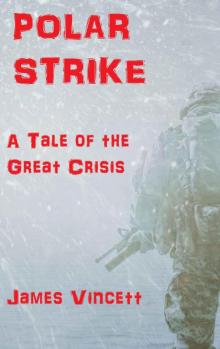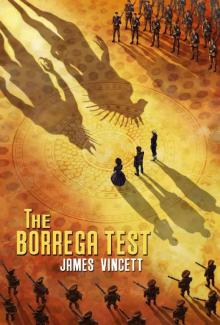- Home
- James Vincett
The Borrega Test
The Borrega Test Read online
The Borrega Test
The Second Hominin Union Novel
James Vincett
Copyright © 2017 by James Vincett
All rights reserved
All characters appearing in this work are fictitious. Any resemblance to real persons, living or dead, is purely coincidental.
Cover credit to Filip Velkovski
www.homininunion.com
E-book ISBN: 978-1-64007-765-2
Discover other titles by James Vincett
The Anuvi Incident
Polar Strike
Hope’s Surprise
Table of Contents
Part I: Blood and Empire
Part II: Secrets and Conspiracies
Part III: Enemies and Allies
Part IV: A Test of Sovereignty
Part V: Ghosts of Wars Long Past
Epilogue: Anuvi
Afterword
Appendix I: Dramatis Personae
Appendix II: Definition of Test of Sovereignty
Appendix III: Borrega Diplomatic Brief
Appendix IV: Order of Combatants, the Borrega Test
About the Author
Every subject’s duty is the king’s; but every subject’s soul is his own
Henry V, Act IV, Scene 1
borrega, from the Spanish
noun
1. Lamb not a year old, marked for slaughter (m. and f.)
2. Simpleton, a soft ignorant fellow. Metaphorical (m. and f.)
3. Con or hoax; a lie or tall tale (m. and f.)
noun, plural
4. Fleecy clouds; white horses; foamy crests of waves (m.)
Part I: Blood and Empire
An empire founded by war has to maintain itself by war.
Charles de Montesquieu
Shirazi
Captain Najafi’s voice crackled over the hand radio. “Remember, don’t push it. Slow and steady. Keep your eyes open for dithya raiders.”
The horses, spread out in single file, crossed the barren windswept plain toward the snow-covered mountains. In the middle of the column, First Lieutenant Darius Shirazi stooped lower in the saddle and cursed the cold bite of the wind. This winter felt particularly cold and dry: his hands felt as rough as sandpaper and painful sores and cracks covered his lips. He turned and again judged the distance between himself and the rider behind him, intent on keeping the distance as unchanging as possible. The strict formation made the column of fifty-two mounts look like a group of dithya tribesmen to any intelligence observing from a high-flying aircraft; any deviation from the standard column and the Shah’s security forces may become suspicious.
Darius scanned the horizon and clutched his rifle. He saw their destination ahead; a gnarled and bumpy range of mountains loomed to the north, the peaks smooth and rounded rather than sharp. Snow covered the higher reaches and rough desert ravines and gorges cut into the sides and feet of the highland. To Darius the mountains looked like a range of melted wax, or a huge wave of stone frozen in time. Known as the Kabir Highlands, the range extended across the entire southern continent like a puckered wound. The ravines and gorges hid sites the dithya tribesmen considered holy, as well as safe havens for the Resistance fighters known as the Disciples of Maziar.
The Shah’s security forces were the greater danger, but more remote. The southern continent of Kabir was the largest on the world of Borrega, and the most inhospitable, largely inhabited by wandering tribes that shunned technology and lived the lives of their ancient Earth ancestors. The Shah’s security forces concentrated their efforts on the coastal settlements, and only occasionally sent a high-flying aircraft over the interior to hunt down the Resistance.
The dithya were the immediate threat, given the differences in faith between the Muslim tribesmen and the Christian Disciples. Christians were a minority, split up among various historical and modern churches, but all managed to survive by carefully navigating the rivalries and conflicts between the hundreds of Muslim sects that dominated the politics on Borrega. Many a time the dithya rode down out of the highlands hooting and hollering on their horses and camels to raid the Disciples’ supply columns, stealing small arms and medical supplies, and slaying the Christian resistance fighters. The dithya hated the Shah of Borrega as much as the Disciples of Maziar, but they would not cooperate with anyone who did not follow their narrow interpretation of the Prophet’s faith.
The column entered a sharp-walled ravine just as the afternoon sun disappeared behind a ridge. Darius shivered and his breath steamed. By necessity, the riders bunched up, but the overhanging cliffs obscured them from any observation above. Looking up at the walls of the ravine, Darius saw not only sensors and cameras, but also figures perched in small lookouts and balconies, aiming their weapons at the column. The ravine soon pinched off, and the caravan rode into a wide crack in the cliff. The passage looked wide and smooth. Yellow electric lights set high in the wall cast sharp shadows. To Darius the place smelled musty and cold.
After a few minutes the caravan entered a large cavern, the roof lost in shadow. A large metal scaffold and staircase climbed upward into the darkness, the bottom of the structure lit by bright white lights. The voices of men and sounds of horses echoed in the cave. Other men appeared from the shadows; they grasped bridles and began to unload the mounts.
The radio crackled again with Captain Najafi’s voice. “Dismount. The recruits will see to the mounts and set up camp, as trained. Lieutenant Shirazi? The General will see you tonight. Wait to be summoned.”
“Acknowledged,” Darius replied. Finally. Darius dismounted and helped with the camp duties. One of the oldest and most secret of the Disciples’ bases on the southern continent, most of the Resistance knew the Kabir Caverns as the source of the weapons and supplies that helped them in their fight against the Shah of Borrega, weapons and supplies that came from off world, from the Hominin Union.
Darius would now meet those who delivered that aid; General Sarafian’s staff had promoted Darius to his staff. The legendary General Sarafian, the resistance fighter who had kept the Shah’s forces off-balance and on the defensive on the southern continent of Borrega for over a decade.
Captain Najafi appeared. Darius had been fighting under Captain Najafi for two years now, in a guerrilla force that performed recon, assassination and asset destruction missions around Razdun, the largest city on the southern continent. The two had seen, and done, much together, and Darius had proved himself loyal and resourceful to the Resistance.
“He’ll see you, now,” Najafi said in a quiet voice. “Meet me at the elevator.” He pointed at the bottom of the scaffold.
Darius shouldered his rifle and crossed the cavern. Two men guarded the elevator. Najafi appeared again, ordered the guards to stand aside, and entered the elevator car. Darius followed.
The car moved upward, out of the glare of the white lights and into the gloom. Softer yellower lights illuminated the top of the scaffold. The car stopped with a screech and Captain Najafi pulled open the gate. Two more guards stood adjacent to the elevator.
Najafi led Darius through a narrow dark passage carved into the stone of the mountain. After a moment, they emerged in a rough, circular chamber. Half-a-dozen men sat at computer consoles, talking in quiet voices into headsets and tapping at keyboards. Colorful images floated on dataglasses or shone forth from flatscreen monitors. The devices displayed views from the entrance gorge and various points throughout the tunnel complex. Through an opening in the top of the chamber, Darius saw the sky, now deepening in color to a dark purple and orange. A figure stood there, silhouetted against the light, his back to the others.
Najafi cleared his throat. “General Sarafian.”
After a moment, the figure turned and descended the s
teps to the floor of the chamber. Like all members of the Resistance, the General wore dun-colored loose pants, a knee-length tunic with loose sleeves and a high collar, and a long coat with over-sized epaulets and large pockets. Four starburst pins glinted on the front of his peaked cap. His face looked tanned and creased, his cheeks and chin covered with a thick white beard.
Najafi and Darius snapped to attention. The General approached Najafi and nodded, then stood in front of Darius.
“At ease, soldiers.” He looked at Darius with pale blue eyes. “So this is Lieutenant Darius Shirazi.”
“Yes, sir.” Darius replied.
“Captain Najafi says many good things about you.”
“Thank you, sir!”
“How are your wife and family?”
Darius blushed. “In good health, sir, thank you. My daughter just turned fifteen months old.”
“Congratulations, Darius. What is her name?”
“Rahela.”
“Beautiful, is it not?”
“Yes, sir,” Najafi replied.
“Our children; that is why we do what we do. Wouldn’t you agree, Darius?”
“Yes, sir.”
“Many of us have even made the ultimate sacrifice.” He put his right hand on Darius’ left shoulder. “I fought with your father.”
Darius’ legs almost buckled. He was four years old when his mother told him his father would never be coming back. In his memory, he saw the tears streaming down his mother’s face as she choked on her sobs. No one could tell them what happened. It was too risky. They would probably never know. Darius had lived with the uncertainty ever since.
Sarafian smiled. “You look like him, tall and strong.”
“How did he die?” Darius blurted, his heart pounding. Captain Najafi hissed at Darius’ lack of protocol, but Sarafian raised his hand.
“Lieutenant Malik Shirazi saved my life, and all of the remaining lives in the platoon I commanded. We had just raided one of the Shah’s secret military bases, near Ulama, on the far western side of the northern continent. Your father took a shot for me. He was gravely wounded, and couldn’t move. Things were happening so fast, we couldn’t treat him and we couldn’t move him. He asked for a pistol and a belt of grenades and he held off the enemy long enough so we could escape.” He paused, looking into Darius’ eyes. “He died a hero, Darius.”
Darius couldn’t hold back. He sobbed, his chest heaving. Darius knew about Ulama, what the Resistance had found there, proof of the Shah’s collaboration with the Naati. At Ulama the Naati had been experimenting on Resistance fighters captured by the Shah’s security forces: drug and genetic testing, vivisection, and psychological torture. Darius did not know his father had aided in that discovery. Below the grief, a fierce pride bubbled up into his chest. He coughed and wiped the tears from his face.
Sarafian removed his hand from Darius’ shoulder. “The Shah fears the Hominin Union and what it may do if the Naati directly attack the Resistance. Grand Admiral Kilgore of the Imperial Navy supplies us with arms and equipment, even though this support could cause war between the Union and the Naati.”
All of the Resistance soldiers knew Kilgore’s name; some regarded the Admiral with suspicion, but most fighters, including Darius, thought the man a hero. They well knew that Kilgore supplied them with arms at great risk to himself, and that these precarious supply lines were virtually the only thing keeping the Resistance alive against the Shah’s tyranny.
Sarafian smiled. “Yes, we play a dangerous game. Admiral Kilgore may be our ally, but the Union is not. The Consul of the Hominin Union could well decide to bring Borrega within the fold. That is also something we do not want to happen. United Earth was the most corrupt and decadent empire in the history of Humanity, but the Hominin Union is not much better. We Christians want to remain free of the Shah, the Naati, and the Union. We are walking on a high and narrow mountain ridge, our destination a peak somewhere ahead and invisible in the clouds, with a fall of a thousand feet on either side.”
Sarafian looked at Darius, his eyes wide. “I need you at my side, Darius. We have entered a new phase of the conflict. Kilgore has given us enough supplies, arms, and intelligence that we can make a major strike against the Shah and his Naati allies. Soon. Just one more piece remains.”
Darius felt a surge of pride. The honor General Sarafian had just bestowed on him was immeasurable. His love and respect for his commander grew fivefold, and he knew he could lay down his life for this man.
“We’re receiving a transmission sir.” One of the technicians looked up from his console. “This might be it.” The tech tapped at his keyboard. “The transmission is fully encrypted with the correct protocol.”
Sarafian nodded. The tech spoke into his headset. “This is Kabir 1. Please respond with the correct security identification.”
A voice crackled over the radio. “This is Kekayvus, Kabir 1. I say again, this is Kekayvus.”
The voice startled Darius; whoever it was spoke Persian, but with a seemingly odd, and old, accent. Kekayvus was the name of Saint Maziar’s father. Very few outside of the faith knew that name.
“We receive you, Kekayvus. Please transmit telemetry and course.”
“Telemetry and course transmitted. I have a problem, Kabir 1. A hostile vessel has discovered me. It is moving to engage.”
Sarafian held up a headset to his face. “How is that possible, Kekayvus?”
“Hostile vessel is not one of the Borregan security forces. It is …” The transmission became garbled.
“Say again, Kekayvus.”
“Hostile vessel is Red Orb, Kabir 1. I repeat: hostile vessel is Red Orb.”
Darius saw Sarafian’s face turn the color of ash. “Is the cargo secure, Kekayvus?”
“Cargo is secure, Kabir 1. Do you want me to proceed to normal landing site?”
That’s a good question. The hostile vessel attacking Kekayvus may represent a danger to the Kabir Caverns. Darius clearly saw the anxiety on Sarafian’s face. Darius didn’t know what the cargo was, but it seemed to him Sarafian had to decide whether the value of the cargo warranted the possibility of the enemy discovering the Kabir Caverns. However, if Kekayvus dropped the cargo elsewhere, there was a risk they could not retrieve it.
Sarafian paused for a moment. He closed his eyes and muttered something. He opened his eyes and looked at Darius, Najafi, and the others. “Proceed to normal landing site, Kekayvus.”
A warbling sound filled the air. “…Kabir 1. Say again!”
“Proceed to normal landing site!” The warbling sound filled the air again. “Did Kekayvus receive?”
The tech tapped at his keyboard. “Unknown. Transmission jammed at the source.”
“How long?”
“Twenty-two minutes, maximum,” another one of the techs said, “if Kekayvus is coming in on the standard trajectory.”
“It looks like he is,” the first tech said, “judging by telemetry.”
Sarafian looked at Najafi and Darius. “The Shah has loosed the Naati against us.”
Darius almost lost control of his bladder.
“Why now, I do not know, but I suspect Kekayvus can tell us. Escort the supply trucks to the landing site and recover the cargo; the night may give us cover against any observing aircraft. Then get back as quickly as possible and take up defensive positions here in the cavern. Go!”
Is he serious? Horses against the Naati?
Darius and Najafi emerged from the elevator and began shouting orders. Two lines of horses, a dozen each, formed behind a column of three large eight-wheeled trucks. Darius led one line of horses, and Captain Najafi led the other. As the drivers powered up the diesel engines, Darius checked his kit. He held a well-used but serviceable projectile rifle he received over a year ago. In his jacket, he carried four magazines of ammunition, two smoke grenades and two fragmentation grenades. On a belt around his waist hung a holster and sidearm. He pulled a night vision device from one pocket and slipped it o
nto his head. He looked back to see his men do the same. He checked his headset connection to the radio in an inside pocket.
The lead truck lurched into motion, and the other two followed. Diesel fumes filled the air as the vehicles moved into a narrow passage. Darius saw men in the trucks’ gun cupolas. The men on horseback followed a few lengths behind.
“Soon as the trucks emerge into the open,” Najafi commanded, “I’ll move forward and scout the road to the landing site. You and your team stay with the trucks.”
After a few moments, the trucks passed through a set of open doors. Darius saw men with weapons on either side of the archway, aiming outward into the night. Night had fallen: stars, filled the night sky with vast intricate networks of light. A slight breeze caressed Darius’ cheek as he pulled the night vision device down over his eyes. In the green light of the device, the desert became a vast rolling plain of light green beneath the darker shade of the sky. Most of the Shah’s security forces had nothing like the night vision, another advantage provided by the Hominin Union.
The trucks cleared the archway and drove down a narrow gravel road. Darius saw Captain Najafi spur his mount and gallop ahead of the vehicles, his men following. As the soldiers pulled their weapons free, he saw the bright green laser sights from each weapon sweep over the desert landscape. He signaled his own men to spread out around the three trucks.
Darius had entered the Kabir Caverns from the south, but the supply column moved north over the rolling desert, following a narrow gravel road. He heard General Sarafian’s voice over the radio. “Kekayvus is incoming, no more than two minutes out.”
Darius noticed a bright light in the sky to his left. It flared so bright it almost overwhelmed his night vision. He pulled off his night vision goggles just as a loud boom echoed over the desert. Almost immediately another loud boom sounded.

 The Dreaming Oceans of San Miguel
The Dreaming Oceans of San Miguel Polar Strike: A Tale of the Great Crisis
Polar Strike: A Tale of the Great Crisis The Borrega Test
The Borrega Test